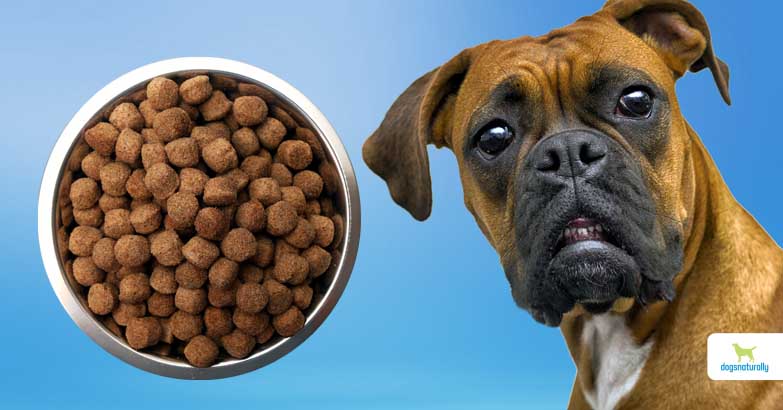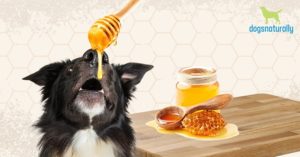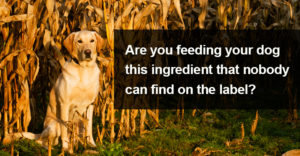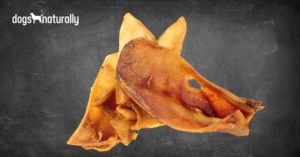Grain-free diets have confused a lot of dog owners. If you feed a species-appropriate whole food diet of raw meat, bones, and organs with some veggies and fruit, you could describe it as a grain-free diet. And that’s the best food you can give your dog.
But that’s not what the dog food manufacturers mean by “grain-free.” The term “grain-free” is marketing hype. Pet food manufacturers don’t really want to eliminate grain and carbs from the canine diet.
They don’t intend to sell you a diet like your dog’s ancestors ate in the wild. They want you to buy a bag of kibble filled with a new collection of starches and carbohydrates. So what does “grain-free” really mean when it comes to kibble, and is grain-free bad for dogs?
What Is Grain-Free Dog Food?
Kibble needs starch to hold it together, and most kibble uses grains as starch ingredients. Grains are the hard, dry seeds of grasses like wheat, rice, corn, oats, millet, rye or barley. Grain-free dog food contains alternative carbohydrate sources instead of grains … usually in the form of legumes like lentils, beans, or peas. They’ll also use potatoes, sweet potatoes, or quinoa.
Problems With Grain-Free Dog Food
Grain-free doesn’t mean sugar-free, carb-free, fat-free, or GMO-free. And it’s a misconception that grain is replaced with more meat (the truth is far from it). Or that you might be getting a higher quality of ingredients or fewer calories. Grain-free dog diets could be increasing your dog’s carb intake!
And a grain-free dog food doesn’t mean it’s healthier or better. Your dog’s diet should always be balanced and nutritionally sound regardless of its ingredients.
It’s like thinking gummy bears are healthy because they’re gluten-free and fat-free. They’re still filled with sugar and other chemicals and are not the least bit nutritious.
7 Reasons Grain-Free Dog Food Is Bad For Dogs
Grains are being replaced by other starches and carbohydrates that don’t offer any greater nutritional value than the grains they’re replacing. And these substitutes can cause even more health problems for your dog.
Grains, starches, legumes … basically any carbohydrate or processed food … really don’t belong in a carnivore’s diet. However, if you’re feeding grain-free kibble, here are some things you should be aware of.
1. Low Quality Proteins
You’ll also see soy products used as a cheap protein source. Soy is biologically inappropriate, highly processed, and often genetically modified. It strikes out in most dietary areas related to your dog’s diet. Soy is difficult to digest and can lead to health problems. According to a 2015 Malaysian study by Sukalingam et al, soy protein can cause hormonal disturbances, carcinogenic and organotoxicity (1).
It’s the same for other legumes used as plant-based protein, like lentils, peas, or beans. They’re cheap sources of protein but they’re also high in starch.
Dogs are facultative carnivores meaning they thrive on meat and animal products … but they can digest plant material. But it doesn’t mean they should. Just like other kibble, grain-free kibbles are made with highly processed meat and bone meals that are hard for your dog to digest. Some contain animal remnants that were unfit for human consumption. They might not be grain-based foods, but they’re not any better for your dog.
2. Low Quality Starches
Starches aren’t included in grain-free dog food for their nutritional value. Starches like potatoes, green peas, sweet potatoes are sources of carbohydrates … cheap ingredients that hold the kibble together. You’ll usually find them high on the ingredients list. And they can be highly inflammatory in dogs. Like legumes, they are biologically inappropriate, add calories and contribute to obesity. They’ve also been linked to digestive disorders, skin conditions, and other health issues in dogs.
3. Phytic Acid
Grain-free foods that use cheap plant proteins like lentils, legumes, and starches like potatoes, beets, and peas are poor-quality foods. And they can lead to deficiencies in other important nutrients. That’s because these ingredients are high in phytic acid. Phytic acid can hinder the absorption of important nutrients including manganese, iron, calcium, and phosphorus. And phytic acid limits the retention of manganese in the body.
Manganese is important as it’s needed to produce energy, metabolize protein and carbohydrates, and makes fatty acids. And it plays a role in the health and maintenance of bone and cartilage in joints.
4. Glyphosate
A huge problem in plant-based foods (grains and starches) is glyphosate. It’s an ever-present herbicide also known as Roundup, and it’s the most prevalent toxin in food today. The World Health Organization describes glyphosate as “a probable human carcinogen” and “a known animal carcinogen.” And here are more problems it causes:
- It interferes with beneficial bacteria and disrupts the microbiome and damages the immune system.
- It blocks proteins, including amino acids, that form in plants.
- Glyphosate affects the inner lining of the kidneys so they don’t excrete waste properly. Are you wondering why dogs are getting kidney disease at younger and younger ages?
- It damages mucous membranes, including the gut lining … causing leaky gut syndrome.
- It causes leaky gut and that’s been linked to … autoimmune disease, inflammatory bowel disease, all chronic inflammatory diseases, chronic allergies, brain issues.
5. Genetically Modified Organisms (GMOs)
Many food sensitivities and inflammation can be related to GMOs. Genetic modification can affect a food’s nutritional value as well as its toxic and allergic effects. GM plants are often “modified” to be insect resistant, virus resistant, or herbicide tolerant.
GMO crops include corn, soy, wheat, beets, canola, rice, potatoes, tomatoes, peas, and alfalfa. And the list has grown to include legumes and other starches including potatoes. These ingredients are often in commercial pet foods. Even if ingredients aren’t GMO, chances are the animals used in your dog food were probably fed GMO feed.
Studies show that GMO foods have been shown to cause:
- Liver damage
- Kidney damage
- Damage to other organs including the pancreas and reproductive organs
- Leaky gut and immune system issues.
- Endocrine disruption
- Digestive disorders
- Skin and food allergies
- Cancer
- Cognitive issues
6. Lectins
These are plant proteins that can be toxic. They are designed that way to protect plants by making you or your dog sick. They also interfere with your dog’s digestive enzymes. Lectins block the absorption of important nutrients like calcium, iron, phosphorus, and zinc. And they can also lead to inflammation.
RELATED: Things you need to know about lectins …
7. Grain-free Dog Food and Heart Disease In Dogs
It was in 2017-18 that grain-free dog food was first put under the US Food and Drug Administration’s (FDA) microscope. This followed reports of a dietary link between grain-free foods and hundreds of cases of dilated cardiomyopathy (DCM). Dilated cardiomyopathy (DCM) is an enlarged heart muscle, and it can lead to life-threatening, leading to congestive heart failure. The heart is less able to circulate blood and fluid builds up in the lungs.
The FDA has been investigating this potential link since 2018. There have been more than 1,000 cases and 300 deaths. But as of January 2021, the FDA has not made a final determination. They still advise feeding dogs a “complete and balanced” diet as endorsed by the Association of American Feed Control Officers (AAFCO).
And there’s been some other research. A 2020 review of dietary concerns linked to DCM, conducted by McCauley et al, published in the Journal of Animal Science (2) concluded:
” …based on this review of the current literature, there is no definitive relationship these implicated diet characteristics and DCM.”
A 2021 study by Smith et al at Tufts University (3) analyzed biochemical compounds in grain-free foods under FDA investigation. The researchers concluded that foods containing peas or pea protein, pea starch, or pea fiber were the foods with the biggest differences compared to the grain-based foods in the study, stating:
“Peas emerged as one ingredient that differed across the two diet groups, and was also positively and strongly associated with many compounds that were higher in 3P/FDA foods.”
(3P means foods with pulses, potatoes, or sweet potatoes)
The Theory About DCM And Grain-Free Foods
The suspicion is that grain-free foods may not contain enough taurine to support heart health. Taurine is an amino acid that’s needed for heart health … though it’s not considered an essential amino acid for dogs (it is essential for cats, however).
Dogs make taurine themselves and shouldn’t need taurine supplements. It’s also important in eye, brain, and immune function. Taurine is abundant in meat, but it was discovered that some large breeds, including Great Danes, Retrievers, Doberman Pinschers, and Irish Wolfhounds, can’t manufacture enough taurine when their diet is low in animal protein. The dogs studied were eating grain-free diets that may have led to DCM. … and these particular dogs had their heart disease partially reversed when taurine was added to their diet.
Again, grain-free diets don’t have cereal grains, but they do contain legumes like lentils or peas. These are sources of protein … but not animal protein that contains amino acids like taurine. And grain-free diet manufacturers are saving money by using plant-based proteins instead of meat.
Are Grain-free Dog Foods Good Or Bad For Dogs?
Any commercial dog food that is extruded, baked, boiled, or canned will have its natural taurine level lowered if not eliminated. Even if they add taurine, it’s a synthetic supplement that may not be well absorbed by your dog. But a better quality, grain-free pet food with adequate meat protein can help ensure a healthier taurine content.
Grain-free is still high in starch. And that causes blood sugar spikes with little nutritional value for dogs. Plus the high temperatures used to make kibble destroy nutrients … and denature protein.
But if you choose to feed kibble and your dog has grain allergies, then feeding a grain-free food can be a better option.
Now you’ve learned that grain-free foods provide more marketing and hype than benefits. But it’s still buyer beware. You need to really understand the ingredient list to know what you’re feeding your dog.
RELATED: How to understand ingredient splitting in the pet food industry …
What Should I Feed Instead of Grain-Free Dog Food?
The FDA hasn’t reported any DCM cases from pets fed a raw diet. Taurine is found in all fresh meat diets, especially those with organ meat. If you want to feed a grain-free dog diet without having to worry about risks that come from the alternatives to grain, a fresh, whole food meat-based diet is the simplest and best solution.
You can easily avoid deficiencies in all amino acids, including taurine, by feeding your dog the diet he evolved to eat. And don’t forget to include organs like heart, liver, kidney, and lung. And then your dog will be getting plenty of amino acids and you won’t have to worry about the poor quality proteins in commercial grain-free dog foods.
RELATED: Easy to make raw food recipes …
References
1. Sukalingam K, Ganesan K, Das S, Thent ZC. An insight into the harmful effects of soy protein: A review. Clin Ter. 2015;166(3):131-9.
2. McCauley, Sydney R., et al. Review of canine dilated cardiomyopathy in the wake of diet-associated concern. Journal of Animal Science. Volume 98, Issue 6, June 2020, skaa155.
3. Smith, Caren E., et al. Investigation of diets associated with dilated cardiomyopathy in dogs using foodomics analysis. Scientific Reports.Volume 11, Article number: 15881 (2021).












